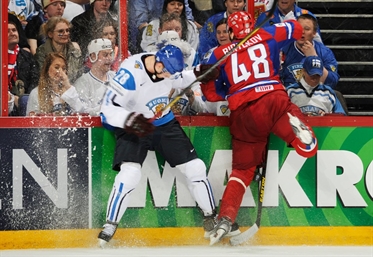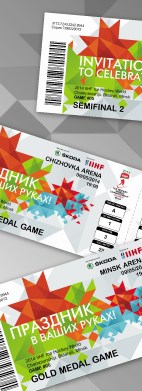When lions meet bears
When lions meet bears
RUS may be favoured, but it’s a coin flip

 Finland edged Russia 3-2 when these two nations last met in group play at the 2013 Worlds, but much more is at stake in Sunday's gold medal game. Expect another tight match. Photo: Richard Wolowicz / HHOF-IIHF Images
Finland edged Russia 3-2 when these two nations last met in group play at the 2013 Worlds, but much more is at stake in Sunday's gold medal game. Expect another tight match. Photo: Richard Wolowicz / HHOF-IIHF Images
The statistics tell an eloquent story. The Soviet Union, known as the “Big Red Machine,” won 37 straight games versus Finland from 1954 to 1991 at the IIHF World Championship. It was no contest.
Finland didn’t face newly independent Russia at the Worlds until 1997. But in the last 17 years, the record between the Finnish Lions and the Russian Bear is seven wins, one tie, and seven losses. Dead even.
Still, funnily enough, Russia is almost always favoured to beat Finland. For the Finns, it’s like being the comedian Rodney Dangerfield with his “I don’t get no respect” routine.
“We play better when we are underdogs, so hopefully we will surprise a lot of people in the gold medal game,” said Finland’s Petri Kontiola.
But really, there shouldn’t be a lot of surprises. Remember Finland’s decisive 3-1 quarter-final victory over host Russia at the Olympics in February?
Sure, there are differences in Minsk. Russia has seven players back from its Olympic squad, while the Finns have five back from the Sochi bronze-medal team.
However, the style of game will remain the same. A superstar goalie (substitute Pekka Rinne for Tuukka Rask) will attempt to hold down the fort with his teammates defending relentlessly and looking for counterattacks against the offensive genius of Yevgeni Malkin, Alexander Ovechkin, and company.
“We’ve played Russia already but their team has changed a little bit,” said defenceman Juuso Hietanen, alluding to the late insertion of Malkin. “There are some mega-stars and it’s a skilled team, but we can win if we play with our system tomorrow.”
What does this mean in practice?
If the Russians can blitz the Finnish net and get an early two- or three-goal edge, they’ll win. If the Finns can keep it close as long as possible, eventually gain a lead, and frustrate the Russians into playing individually and repeating the same tactics fruitlessly (i.e. trying to carry the puck against all odds without ever chipping it in), then the day will belong to Suomi.
From the drop of the puck, the Finns will face arguably a superior Russian goalie than the one who started in the Sochi quarter-final. Finland scored three times on Colorado Avalanche netminder Semyon Varlamov before he was yanked in favour of Vezina Trophy winner Sergei Bobrovski – Sunday’s starter.
“Bobrovski is a world-class goalie,” said Hietanen. “We’ve got to get more shots on goal and traffic in front of his net so he can’t see the puck.”
As great as “Bob” is, though, he doesn’t present an insurmountable obstacle for the Finns.
“The turning point is that we believed we can do this,” said Finland’s Tommi Huhtala about his team’s success in Minsk. “If we don't believe it, no one else will.”
To find the root of Finland’s self-belief against the more talented Russians, you have to go back to February 28, 1988. On that date, Finland achieved its first victory ever against the Soviets at the Olympics in Calgary, Canada.
The score was 2-1, and forward Erkki Lehtonen got the winner on the power play with under two minutes left. It gave Finland an historic silver medal.
In a symbol of how the Soviet system was fracturing, head coach Viktor Tikhonov hit soon-to-defect wunderkind Alexander Mogilny on the bench for making a bad play that led to the goal.
Finnish coach Pentti Matikainen had suffered a 2-1 upset against Switzerland to start the Winter Games. After beating the Soviets, he colourfully proclaimed: “We knew if we lost, we’d be knifed. Now the feelings are opposite and the players need protection because they find lots of people are patting them on the back.”
Of course, the world has changed greatly since those Cold War days. For tangible evidence, look no further than the multilingual agitator Leo Komarov, who was born to Russian parents but plays for Finland.
“I’m from Russia and I have family and friends there,” Komarov said. “I played for five years, and the coach [Oleg Znarok] is my buddy from Dynamo. He's a good guy.”
But the point is that ever since 1988, the Finns have known that they always have a chance when they step on the ice against Russia. And they’ve handed the Russians some monumental IIHF defeats – not only in Sochi.
At the 1994 Lillehammer Olympics, with a 4-0 bronze medal game victory, Finland ensured that Russia would not medal for the first time since it entered Olympic hockey in 1956.
At the 2007 IIHF World Championship in Moscow, Mikko Koivu’s 2-1 overtime winner against Russia in the semi-finals marked the first time the host nation had ever lost a Worlds game in its capital, dating back to 1957.
In 2011, Finland’s 3-0 semi-final win paved the way for the ouster of Vyacheslav Bykov as Russia’s national team coach, as the Russians wound up in fourth place.
Now, don’t get a one-sided picture. The Russians, for instance, hammered Finland 6-2 in the semis when they won their last gold medal – right in Helsinki in 2012. Malkin had a goal and Ovechkin chipped in two assists.
That scenario could easily unfold again in the 2014 final if coach Erkka Westerlund’s players don’t come out ready to play.
Buoyed by a largely supportive crowd at Minsk Arena, the Russians will be eager to take some vengeance on Finland for what happened in Sochi.
“The gold medal is what we are here for,” said Sergei Shirokov after Russia beat Sweden 3-1 in the semi-finals. “That’s why we came to Minsk. Now we need to conserve our strength and play well again tomorrow.”
The Finns lost 4-2 to Russia during group play, but that was with backup Mikko Koskinen in goal. Now the gold medal game of the 2014 IIHF World Championship is at hand, and we’re about to find what both these teams are really made of.
When lions meet bears, it could go either way.
Back to Overview

















































































